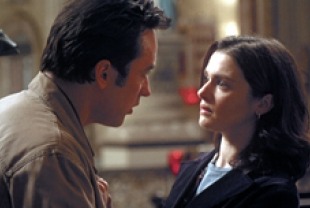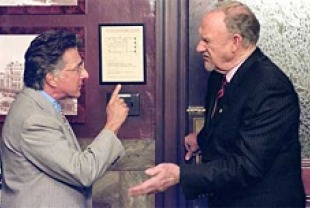Two years after her husband and ten others are killed in an office massacre in which the shooter also took his own life, Celeste Wood (Joanna Gong) decides on the advice of her New Orleans attorney, Wendell Rohr (Dustin Hoffman), to file a civil suit against a consortium of gun manufacturers for compensatory and emotional damages. Since there are 30,000 gun deaths and 100,000 people are disabled by gun products each year, the manufacturers know more is at stake than this one case.
Although Durwood Cable (Bruce Davison) represents the defendants, the real power in the trial lies with Rankin Fitch (Gene Hackman), a jury consultant who has made quite a fortune for himself representing firms that have become targets in the age of large suits against previously invulnerable businesses. As he reminds the gun executives, who have given him $20 million to secure a jury and swing the vote in their favor, it is but a pittance to protect the $2 billion dollars a year they make in profits. His zinger cuts them all to the quick: "Trials are too important to be left up to juries."
Gary Fleder directs this fast-paced legal thriller that swings back and forth from the courtroom to the massive command center set up by Fitch to monitor the activities of the jurors and to dig up dirty little secrets that he can use to get them on his side. Wendell Rohr also has a jury consultant (Jeremy Piven), though they spend most of their time figuring out what Fitch is up to.
The complex screenplay, based on a 1996 novel by John Grisham (The Firm, The Pelican Brief), is always fascinating, thanks to the two mystery characters who threaten to derail Fitch's carefully orchestrated program. Nick Easter (John Cusack) is an entertaining and charming young man who works at an electronics store. He dips under Fitch's radar and gets on the jury, then turns out to have an agenda of his own. His girlfriend, Marlee (Rachel Weisz), is his confidant and accomplice.
To reveal more would be to spoil all the plot twists and turns. Suffice it to say, the film zeroes in on the unsavory methods used by the gun industry to protect itself. Sound familiar? As one of the characters says, everybody knows politics and sports are rigged, why not the courts as well? The other metaphor that comes to the fore is that everything that happens in the trial is seen in terms of wining or losing a war. Runaway Jury is another prime example of the gladiator culture in America.
The DVD extras include a director's commentary by Gary Felder, some deleted scenes, and featurettes on making the film, the acting, cinematography, production design, and editing. But the real value here are a number of segments with Gene Hackman and Dustin Hoffman. In "Exploring the Scene," they discuss their first appearance in the film. In another, they talk about other scenes and the experience of working together.

